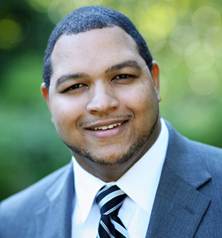This interview is adapted from a segment in the Brookings Cafeteria podcast called “Coffee Break,” where a scholar new to Brookings introduces their background, research interests, and offers book recommendations. The transcript has been slightly edited from the audio recording.
I’m Marcus Casey, I’m a Rubenstein Fellow in the Economic Studies program here at Brookings.
Q: Where did you grow up?
When I was a young child, I lived in Chicago on the South Side, and moved around quite a bit, so I lived in various neighborhoods. When I got a little bit older, my parents worked out an arrangement where I would live with my father in Texas— East Side Fort Worth, TX, to be specific— during the school year, and I would spend summers and vacations back home in Chicago with my mom. So I lived in both Chicago and Texas.
Q: What inspired you to become a scholar?
To be honest, I’m not really sure I can pinpoint any particular thing that inspired me to become a scholar. When I was a child I was always intellectually curious. I used to read encyclopedias and books, and I always had an interest in historical fiction and things of that nature. When I got older and went off to college, I intended to be a lawyer, as most undergraduates who don’t have a clear path seem to think. But later I did a summer program, the American Economic Association Summer Program, where I was introduced to using social science tools, specifically quantitative tools, to look at a lot of societal issues and problems. That really intrigued me, so I decided on a whim in the last year of college to go on and become an economist.
Q: What do you think is the most important issue we’re facing today?
If I was going to say one important issue, it would be inequality. I think inequality is one of our biggest issues because it feeds into a lot of things, politically, socially, and other aspects of society that some people have considered problematic. It feeds into those issues in part because inequality creates this sense of pessimism for many people. If you look at a lot of the major cities in this country, the relatively affluent can effectively wall themselves off from the less affluent by virtue of nothing necessarily nefarious, but just by virtue of the fact that we use prices to determine who gets what in this society. As a consequence, the more unequal our society is getting, the more people who are on the less affluent side of the divide feel like they have very few opportunities to get to the affluent side, which is typically seen as the American Dream. As a consequence, I think it contributes to political dysfunction, tribalism, and a lot of the ills that people have talked about.
Q: What are you working on now?
I have my feet in a number of buckets, so to speak. My primary area of research is looking at neighborhood amenities, how people value them, and how changes in those amenities affect individual decisions.
I’ve also been looking at the consequences of the intensity of violent crime on various aspects of neighborhoods. For example, my colleague and I have looked at how violent activity can affect school accountability measures and teacher sorting across schools.
Some other work I’m doing is looking directly at inequality both from a current perspective, like the Earned Income Tax Credit and other transfer policies, and to what degree they can mitigate the inequality that we have in cities and urban areas, and also looking at some of the historical determinants of inequality and social mobility.
In terms of other work, I’m also looking at school choice and charter schools. Some work that I’ve recently done is looking at the structure of charter school markets, and whether it fosters quality improvements among charter schools. Some of the extensions to that work include studying the long term effects of charter school attendance, as well as whether charter school entry actually has any effects on local public schools.
Q: If you could recommend any book to our listeners, what would it be?
If I were going to recommend one book, it would be the Twilight of the Elites by Chris Hayes, the MSNBC host. I think what he does in that book, and the reason I recommend it, is that he describes in a very cogent fashion what is driving the lack of faith in the principal institutions in the United States, feeding hopelessness and translating into what some people have described as political chaos. It came out several years ago, but it’s one of the best analyses that help explain some of the things that we see in the news.
Related Content:
The ethics of reducing inequality
The Brookings Institution is committed to quality, independence, and impact.
We are supported by a diverse array of funders. In line with our values and policies, each Brookings publication represents the sole views of its author(s).


Commentary
Meet Marcus Casey, new Rubenstein Fellow in the Economic Studies program
June 22, 2018